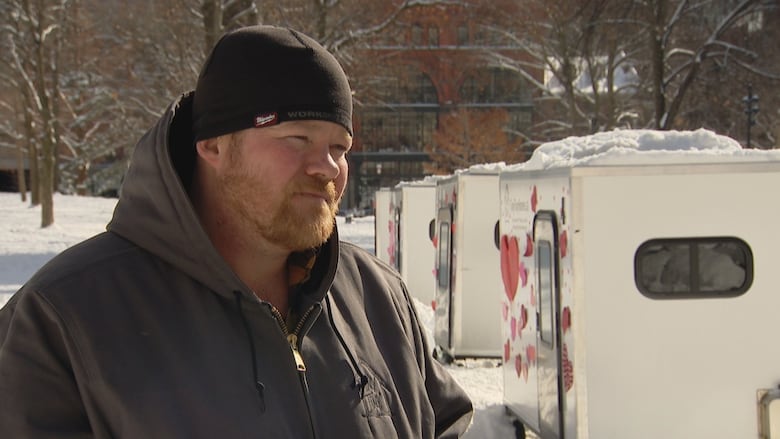Toronto orders creator of tiny mobile homes for unhoused people to stop
Cease and desist letter says shelters violate municipal code

- UPDATE: Toronto Mayor Olivia Chow has intervened in the dispute between the city and Ryan Donais, saying she has reached out to him and none of his structures will be removed from a city park "in the near future."
The City of Toronto has sent a cease and desist letter to a man who's built several tiny mobile homes giving temporary shelter to those experiencing homelessness, ordering him to remove them from city property.
Ryan Donais started building the small modular homes last summer, later registering his own non-profit organization, Tiny Tiny Homes, to help create more.
Not wanting his initiative to get shut down by the city, Donais says he designed the homes with several safety features, such as smoke and carbon monoxide detectors and a fire extinguisher. They can be attached to the back of a bicycle and transported to other locations.
Last Friday, Donais received a letter from city lawyers informing him that the structures were "unlawfully occupying" city property and violated municipal code.
"We recognize and appreciate that you are acting with good intentions," the letter says.
"However, the City does not condone and cannot permit the installation of these structures for occupation on City property."
According to the letter, the structures — most of which are located in St. James Park — interfere with the public's right to use and access city parks. The structures also present health and safety concerns, the letter says.
It says the city is ordering Donais and Tiny Tiny Homes to stop installing the structures and to remove them.
Donais said he was surprised by the letter, and that it arrived the week after he'd met with officials to discuss the homes, discussions he says he thought had been positive.
"It kind of hurt our hearts," Donais said.
Prior to that meeting, he said he'd been trying to get in touch with city officials, seeking an approved space to put the structures.
"We're only here because of their failure of action. Give us a place to put them, and let's get them out of the park," Donais said.

A spokesperson for the city said that during that meeting, officials informed Donais that the structures aren't allowed in city parks .
"While the city may consider micro shelters in future initiatives, they are currently not permitted on any city-owned properties in Toronto," the spokesperson said.
Tiny Tiny Homes responded to the cease-and-desist in a letter Wednesday, arguing that that the shelters are mobile and aren't installed in any set place. The letter also says Tiny Tiny Homes won't construct any more shelters "until we have resolved this."
'Peace of mind'
Brent Blake has been living in one of the shelters for about three weeks. He said the shelter has given him a safe place to live while coping with throat cancer and waiting for subsidized housing.
"It gives you peace of mind. You're not wondering where you're going to go," said Blake, who's been experiencing homelessness on and off for years.

Blake says he thinks the city is wrong to order Tiny Tiny Homes to stop what they're doing, when the city can't find places to live for everyone who's in need of housing.
"Why not let organizations start doing it? Because they can't do it," Blake said.
Non-profit needs to follow bylaws: councillor
Coun. Chris Moise, who represents the Toronto Centre riding where the shelters are located, said he put forward a motion last year asking city staff to look into spaces for the moveable modular homes.
However, he said he's concerned that Tiny Tiny Homes has been arbitrarily placing the shelters without going through proper channels. He said he's received complaints from area residents about the shelters, particularly because they're heated using diesel gas.
"I just find that, you know, it's well-intentioned, but that's not the way we function in the city," Moise said.
"We have by laws that we must all abide by, including myself as a local councillor. We just can't arbitrarily just do what we want."
Moise said he wasn't aware of the cease and desist letter, but hopes Tiny Tiny Homes can work with the city "rather than working around us."
On Thursday, Donais said his organization is figuring out its next steps, but he hopes they can work something out with the city.
"We need our parks back and we need these vulnerable citizens to have a better, more secure place for housing," he said.
With files from Dale Manucdoc



